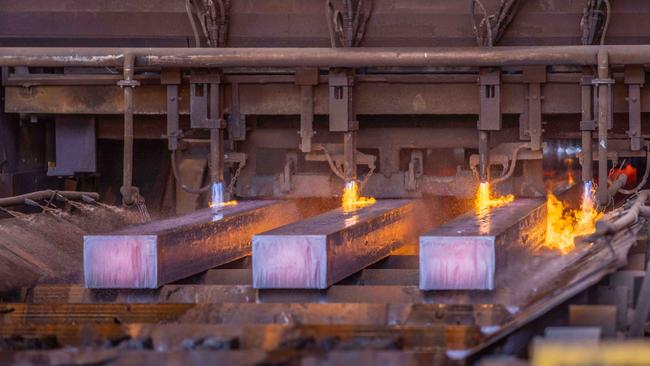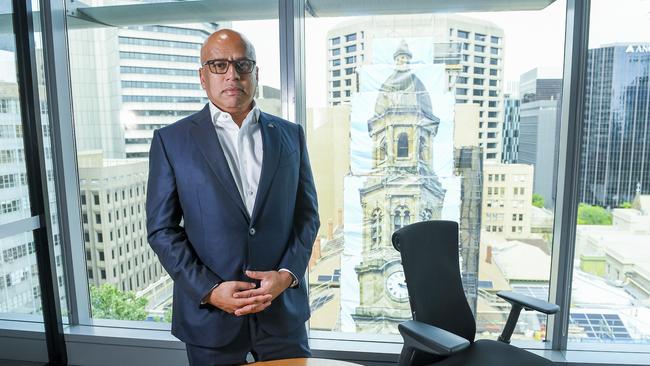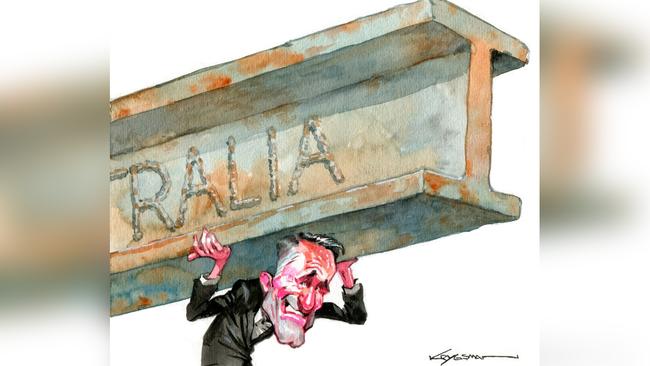
The backdoor tariff increase come at a time of rising global tensions and as incoming US President Donald Trump threatens to impose punitive tariffs on China.
The Australian imposts come via a rarely used anti-circumvention investigation which considers tariff increases on goods which are similar to those already hit with dumping duties.
The products under attack are steel mesh used for reinforcing concrete, which Gupta’s Infrabuild claims are similar to wire rods which come into the country under different tariff classifications and are, by definition, finished products.
The government entity investigating claims, the Anti-Dumping Commission (ADC), has twice delayed its reporting schedule – effectively freezing trade without a decision being made on the veracity of the claims.
The ADC comes under federal Industry Minister Ed Husic’s control.
South Australian Premier Peter Malinauskas has taken a direct interest in the fate of the Whyalla steel mill because its collapse would cripple the local community.
The ADC said the anti-circumvention delay was because “there have been delays completing verification of relevant data and because of the commission’s changing business requirements”.
German steel giant Thyssen Krupp dismissed the arguments as nonsense, arguing the ADC’s actions were in breach of World Trade Organisation rules and were “contrary to the national interest”.
It said the ADC “inquiry should be terminated”.
Chinese concerns were made clear last week when the ADC opened a fast-track review of claims by another Chinese producer, Baowu Group Echeng, which is seeking exemption for any dumping duties.

This can happen if the exporter was not involved in the previous investigations.
Dumping happens when goods land in Australia at below the normal values in the country of origin and cause injury to the local producer.
If duties are imposed, downstream users are hit with extra costs at a time when there is concern about cost-of-living pressures and inflation delaying interest rate cuts.
Gupta’s Infrabuild faces financial pressures in part due to heavy debt loads, the 2021 collapse of Lex Greensill’s empire and difficulties in restarting the aged Whyalla steel mill that Gupta acquired in 2017 for $700m.
None of these issues is caused by imports but the slow Chinese economy does mean that country is exporting more steel.
The ADC issued a notice in the week before Christmas to delay the investigation for another seven months after earlier delaying it for five months. Recommendations are now not due to go to Husic until October this year.
A change in federal government is possible before then, throwing even more doubt over the timetable of the controversial inquiry.
When a product is under investigation trade is effectively frozen because the importer does not want to be liable for increased duty costs after an import order is made.
The finding of the commission’s preliminary review was previously due on January 24 but now will not come until July 16.
If the original timetable were applied to the action, first initiated in May last year, recommendations would have been handed to Husic in August last year.
The matter should top the to-do list for new anti-dumping commissioner David Latina who is due to start work on January 13, having been appointed 12 months after his predecessor, Bradley Armstrong, retired.

The ADC can terminate the anti-circumvention case today with no recommendations to the minister necessary unless the bureaucrats thought there was a case to consider.
The aged Whyalla mill is now struggling to be restarted after a planned shutdown and while it is financially ring fenced from the well-run Infrabuild distribution assets, the production problems are not helping.
This means if Whyalla collapsed it would have no direct financial link to the rest of Gupta’s empire.
The anti-circumvention order has attracted strong attacks from global leaders like Thyssen Krupp.
Its lawyers, Canberra-based Daniel Moulis said in an ADC submission Thyssen Krupp was “not cognisant of any new fact or legal interpretation that could spring rabbit-like out of a hat and magically cause the commission to decide that steel mesh was a slightly modified version of rod in coil”.
Importer Sanwa’s David Roberts rejected the notion that finished mesh was really wire rods, arguing “a two tonne coil can be a pigeon because they are the same colour”.
“Either Infrabuild is trying to protect its market or someone else thinks there may be an opportunity,” Roberts said.
In its submission, Infrabuild trade guru Steve Porter argued that “the market for rod, for mesh and reinforcing mesh are inextricably linked and one is a substitute for the other”.
Thyssen Krupp said “the ultimate application for which steel mesh is designed is to be encased in and become part of concrete slabs. Rod in coil cannot be encased in concrete”.
It is perhaps not a coincidence that the trade delays initiated by Infrabuild come as steel reinforcing bars are the centre of planned new competition for the company; three new electric arc furnace plants are due to commence in 2027 in Queensland and one in Perth.
The furnaces reheat steel scrap and all three are targeting the market for mesh which is used to reinforce concrete.
Dumping action adds costs to end consumers – who in this case are builders and ultimately their customers.
An investigation delay ramps up costs for new building at the same time the industry is suffering from the prolonged dispute between the MUA and Qube.
Toowoomba-based GM Steel looks set to be the first into mesh production in early 2027 ahead of Azlan Ho’s WA-based Collie Steel and, bringing up the rear, Grant Johnston’s Westview.
Johnston is relaxed, noting that his Bestbar distribution and Infrabuild effectively control the downstream market, leaving the other two newcomers scratching for a route to market.
All three will benefit if Gupta’s Whyalla mill fails to restart.
Thyssen Krupp has questioned the validity of the reasons for the delay but the ADC took little notice of its complaints by extending the timetable further after its submission was lodged.
Ministerial recommendations were delayed from March 10 till October 1 and the due date for the preliminary statement of issues from January 24 to March 10.
Thyssen Krupp said the ADC has compounded the issue by extending the inquiry, increasing “the fear of importers about the risk of punitive duties”.
“Simply ‘parking’ an anti-circumvention inquiry for a long period of time is enough to slow down or stop trade activity in the products complained against,” it said.
“This starves important Australian industries (in this case, the construction, building, and housing industries) of needed products and forces prices up, without there being any proven legal justification to do so.
“Not only is such an outcome WTO-illegal, it is also contrary to the national interest.”




The federal government is backing embattled financier Sanjeev Gupta’s battle against steel imports, effectively freezing trade with China on steel mesh imports and increasing building costs in Australia.